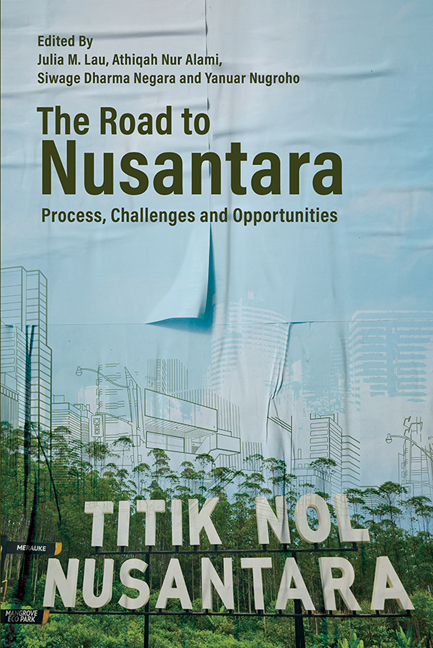Book contents
- Frontmatter
- Contents
- List of Figures
- List of Tables
- Foreword
- Foreword
- The Contributors
- Glossary
- Introduction: The Road to Nusantara—Process, Challenges and Opportunities
- PART I PROCESSES AND PATHWAYS TOWARDS NUSANTARA
- PART II CHALLENGES IN DEVELOPING NUSANTARA
- PART III OPPORTUNITIES FOR NUSANTARA
- Conclusion: Shaping Nusantara
- Index
4 - Crowdfunding for IKN: Potential, Risk and People’s Perception
Published online by Cambridge University Press: 01 March 2024
- Frontmatter
- Contents
- List of Figures
- List of Tables
- Foreword
- Foreword
- The Contributors
- Glossary
- Introduction: The Road to Nusantara—Process, Challenges and Opportunities
- PART I PROCESSES AND PATHWAYS TOWARDS NUSANTARA
- PART II CHALLENGES IN DEVELOPING NUSANTARA
- PART III OPPORTUNITIES FOR NUSANTARA
- Conclusion: Shaping Nusantara
- Index
Summary
Introduction
“Citizen participation” can be defined as the active involvement of the general public in the government's decision-making process to influence and address issues of public concern. It covers a range of practices, from volunteering to political participation. Civic participation is similar, although it includes involvement in non-political activities. The advancement in digital technologies has enabled collective participation and civil actions, encouraging greater participation, better decision-making and more trust.
Among different forms of civic participation, crowdfunding has emerged as one type of public participation in a democratic environment. The ability to accept small amounts of money from a larger number of people positions crowdfunding as a platform for citizens to express their views on services that they require and their civic rights. It allows citizens to participate in society and the government by donating their resources as an act of support for particular programmes or projects. It also allows social movements to pool financial resources from the public relatively quickly. This potential should be emphasized because a system that handles and provides civic services would result in increased citizen participation. Crowdfunding also allows citizens residing outside the country, or diaspora, to participate in the projects. The diaspora community is said to be more willing to participate in smaller-scale but beneficial initiatives that many larger project backers would not pursue. With an expected number of 8 million Indonesians in the diaspora with an average monthly income of US$1,999,7 this potential should not be overlooked.
In August 2019, the Indonesian government announced its plan to move the capital from Jakarta to a new city in East Kalimantan province. The new capital is named Nusantara (also called IKN) and its construction is targeted to be completed by 2045. Government officials are set to move to the new capital in stages. The development is divided into three main stages: developing the urban infrastructure, developing the city along with the economic sector and moving government officials to the new capital, then finally increasing connectivity with other cities near the IKN.
- Type
- Chapter
- Information
- The Road to NusantaraProcess, Challenges and Opportunities, pp. 75 - 104Publisher: ISEAS–Yusof Ishak InstitutePrint publication year: 2023



